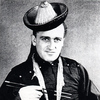A carved stone figure of a Chángméi Luóhàn, Ming dynasty or older.
Finely carved face, with down cast eyes and prominent eyebrows below a prominent bulge at the front of the head. Height 26,5 cm.
Provenance: Formerly in the collection of Danish Archaeologist, Ethnographer, Art Collector and Museum Director Werner Jacobsen (1914-79). For more information, see below.
Wear.
Alkuperä - Provenienssi
Formerly in the collection of Danish Archaeologist, Ethnographer, Art Collector and Museum Director Werner Jacobsen (1914-79). Jacobsen studied archeology and participated 1938-39 in the Danish Royal Geografic Societys Expedition to Mongolia under the lead of Henning Haslund-Christensens.
During the years 1946-59 he lived in India and Nepal and acquired many pieces for National Museum in Denmark, The Royal Library, the Moesgård Museum and himself. He set up a scientific center in Kathmandu, Nepal and later in Denmark where he organized all the material and information he had gathered.
In 1940-45 he was employed the Danish National Museum, in 1961 he became Museum Director for the Etnografic Collection. 1963-78 he was the head of the information and educational Department at the Museum. The collection was acquired from Werner Jacobsen as a whole when he sold it to gather funds for new expeditions. Thence by descent to the present owner.
Kirjallisuus
Werner Jacobsen published various literary and academic works such as; Bronzer fra Mongoliet, Köpenhamn, 1940, Some Observations on the Origin of Sino-sibirian Animal Bronzes, Köpenhamn 1941, Buddhsitisk Skulptur I Kina, Köpenhamn, 1941, Kabuki, det Japanska folks teater, Köpenhamn 1941, Todaerne, - en idisk bjergstamme, Köpenhamn 1949, Maleri fra Puri, Orissa, Indien, Köpenhamn 1961, Thailand, Arkeologi og Kunst, Köpenhamn 1961. Originale Bloktryk fra Nepal, Köpehamn, 1966, Asiatiske Akkorder, Köpenhamn 1965, Buddha og det modern menneske, Köpenhamn, 1970, Kunsten, kunstneren og inderen, Köpenhamn, 1970, Den hvide mans byrde, Köpenhamn, 1970, Hvad er den egentlige virkelighed, Köpenhamn, 1976, Den hvide gud, Köpenhamn, 1973.
Muut tiedot
Buddhist tradition tells of groups of 16, 18, or 500 luohans who were commanded by Buddha to await the coming of Maitreya, the Future Buddha. This promise of salvation held great appeal to Chinese Buddhists at the end of the ninth century, for they had just been through a period a great persecution, and a cult built around the luohans as guardians gained momentum at that time.
According to legend, Asita was born with two long white eyebrows. The story was that in his previous life he was a monk who, though having tried very hard yet could not attain enlightenment even at a ripe old age, and had only two long white eyebrows left. After his death he reincarnated as a human being again.
After he was born, his father was told that Shakyamuni Buddha also has two long eyebrows, therefore his son had the look of the Buddha in him. As a result, Asita was sent away to a monastery to become a monk, eventually attaining enlightenment.



















































